ENVIRONMENTAL SUSTAINABILITY
In recent decades, the emphasis on environmental issues has grown significantly: humanity is consuming the limited resources of planet Earth much faster than it can regenerate. A global social effort is fundamental to safeguard the present and future of the planet and human kind.
The dual nature of this tendency can arouse two reactions: it is certainly not consoling that the issue has become so topical because it turned into emergency; but it is desirable that sustainability and green policies finally take on greater relevance in social discussion, with the hope that a collective awareness will lead to concrete interventions.
Our every effort, however small, if added to thousands and millions of other small efforts, can become a concrete help to the planet that hosts us.
What we want to analyze in this page is how this can be realized in corporate and entrepreneurial realities.
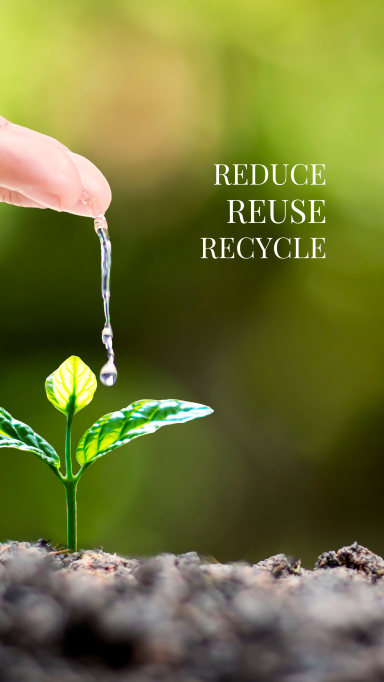
Let’s start by analyzing the meaning of the word: what does sustainability mean?
The etymology of the word derives from the Latin, to indicate defending, taking care or, precisely, sustaining.
The modern meaning acquired in the environmental field, spread from the 1980s on. More precisely in 1987: the World Commission on Environment and Development (WCED) of the United Nations Program gathered in Stockholm and officially introduced the term in the report “Our Common Future”.
This is the official definition of sustainability that was given:
“Meeting the needs of the present without compromising the ability of future generations to meet their own needs” (Brundtland Report, 1987).
The purpose of the conference was to focus international attention on pollution and environmental degradation.
And it was on this occasion that sustainability began to be looked at from the perspective of human impact on our planet in view of future generations, focusing on the maintenance of natural resources and environmental balance.
Over time, the focus has increasingly turned onto the entrepreneurial, institutional and economic side: that is, the realities that can concretely influence the sustainable development of society, and the real conjugation of the concept of green economy.
In the World Summit on Sustainable Development held in Johannesburg in the early 2000s, the concept of sustainability is further explored and combined within social life, assuming three connotations that make the development of economic activities and environmental protection compatible:
- Environmental sustainability: responsibility in the use of natural resources
- Social sustainability: ensuring quality of life, health, safety, justice and services for citizens
- Economic sustainability: ensuring economic efficiency, income and employment
They understood that these three cornerstones are not mutually exclusive, indeed they rather strengthen each other: so much so that in a long-term perspective none of them can exist without the others.
Hence the global commitment to ensure the achievement of three closely linked objectives: economic development, social development and environmental protection.
The integration and interaction of the three dimensions of sustainability are the necessary condition for the development of the next step in the global commitment: the UN Agenda 2030.
But let’s see this together: what is Agenda 2030 and how was it born?
This is a set of 17 goals signed by the UN General Assembly on 25 September 2015, which must be achieved by 2030. Specifically, the points were agreed starting from the principles included in a resolution with the emblematic title of “The future we want” (A/RES/66/288), issued in 2012 at the United Nations Conference on Sustainable Development (UNCSD), also known as Rio +20.
The subjects addressed are many: from the defeat of hunger and poverty, to the reduction of inequalities, to the protection of the environment and the innovation of businesses and infrastructures.
This is where the role that companies can play comes in, as an active part in achieving the tasks that were set.
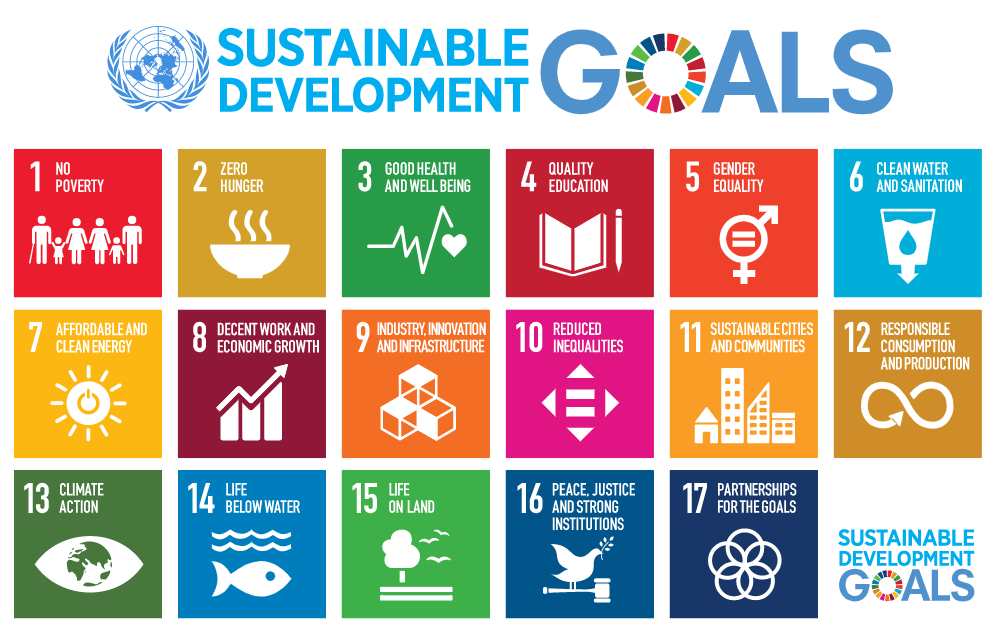
CORPORATE SUSTAINABILITY
Entrepreneurial activities are one of the factors with the highest social and economic impact. It is essential that they be the first to become aware of the need for a change towards a sustainable future.
This is why in the economic-financial scenario we speak of Corporate Social Responsibility (CSR). The European Community in 2001 defined it as “the voluntary integration by companies of social and environmental concerns in their commercial operations and in their relations with interested parties“.
Small, medium and big companies undertake to effectively manage the problems of ethical, social and environmental impact within their activity.
But how is this commitment turned real? By involving every aspect of business into the change, as far as possible: from the management of resources and waste, to the management of production processes, up to the working atmosphere, to gender equality, and diversity.
From the point of view of what is defined as Shared Value, the issues of social and environmental sustainability are contextualized within the business, bringing the focus on the creation of a virtuous circle that eliminates trade-offs and enhances the return on investment, generating precisely both economic value for the company and social value.
The ethical commitment of a company impacts directly into its value chain.
In practical terms, what is corporate sustainability?
A company is sustainable when it adopts the so-called green practices: structures that aim to reduce the environmental impact of its activities, in organization and management. Specifically by using clean energy, reducing consumption, recovering waste in a circular economy perspective, optimizing and making production processes and logistics more efficient.
Referring back to the 3 sustainability conjugations we mentioned above, in an enterprise they materialize in:
- Environmental sustainability: reducing the environmental impact by making production steps more efficient and paying attention to the consumption of natural resources.
- Social sustainability: guaranteeing equality in the treatment of employees, banning all forms of discrimination; creating safe conditions in the workplace and instill a sense of belonging.
- Economic sustainability: generating value through the production of objects or services capable of improving people’s lives, integrating the economic-financial aspects with the dimensions of social and environmental sustainability mentioned above.
From this point of view, the value of a product lies not only in its functional qualitative characteristics, but also in its non-material ones: the conditions of supply, the customization and consulting services, the production process.
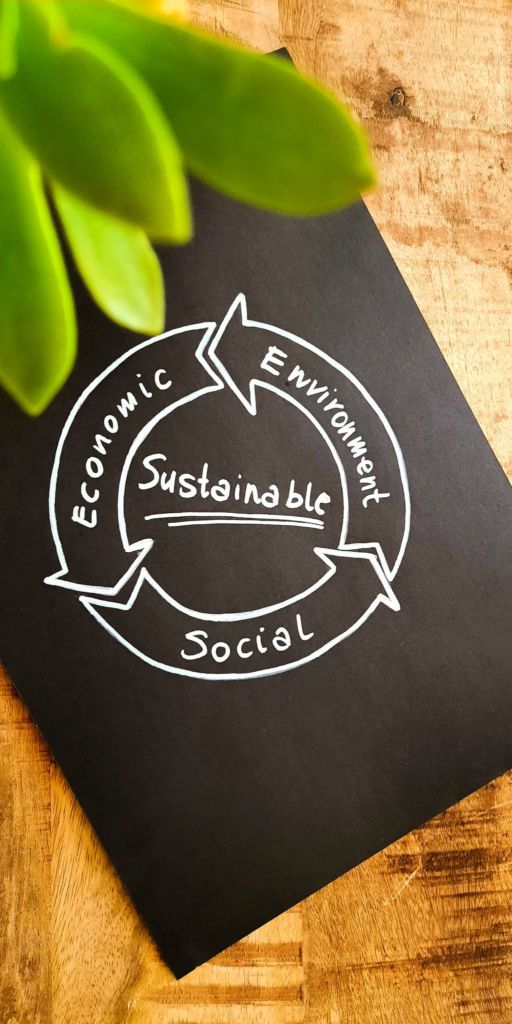
The matrix that conveys the direct effects of man on the environment is consumption, and consequently so are waste and emissions.
Reducing the impact of an enterprise in these levels does not only lead to a reduction in consumption: in a broader spectrum, it implies a complete review of cycle of use, production and disposal.
Starting from the source, potentially every aspect of production can contribute to the purpose. Here are some examples:
- use of renewable sources to generate the energy necessary for the company activities
- installation of energy storage systems for storing the energy produced
- reduction of gas emissions through clean energy, and through the optimization of production and logistics
- use of reused materials, favoring a circular economy of material flows
- reduction of waste
- reduction of technological turnover
It might seem difficult to grasp the link, but sustainability involves also technological innovation.
Indeed, the digital aspect plays a role too. It is perhaps an indirect role in this case, but no less important: digitization makes an innovative change possible both in the products and services offered, as well as in production processes, habits, behaviors and business models. A turning point that, if applied correctly, leads to decarbonisation of the economy without penalizing our living standards.
“Meeting the needs of the present without compromising the ability of future generations to meet their own needs”
SUSTAINABILITY IN SARIV
In the philosophy that guides our business model, environment is a main topic.
Making Sariv a sustainable company is a process that is constantly evolving, but we too try to give our contribution.
Over the years, several green initiatives have been undertaken, and it was essential to interpret the word “environment” according to two different meanings:
- on one hand, of course the world we live in
- on the other hand, the workplace where each of us spends most of our day
Moving from the global to the personal dimension perhaps helps to live the green philosophy more directly, making it more one’s own.
For several years now, the two production plants of Sariv have been enriched with plants.
And no, as much as interior design is fashionable now, of course it’s not just that.
For chromotherapy, green is the color of harmony, which therefore aims to give a feeling of calming.
But most of all they are sentinels of the sanity of the air:
plants have been installed in each department of the production chain, and if the plants themselves are fine, it means that the air in that department is healthy and our operators are working in a healthy environment.
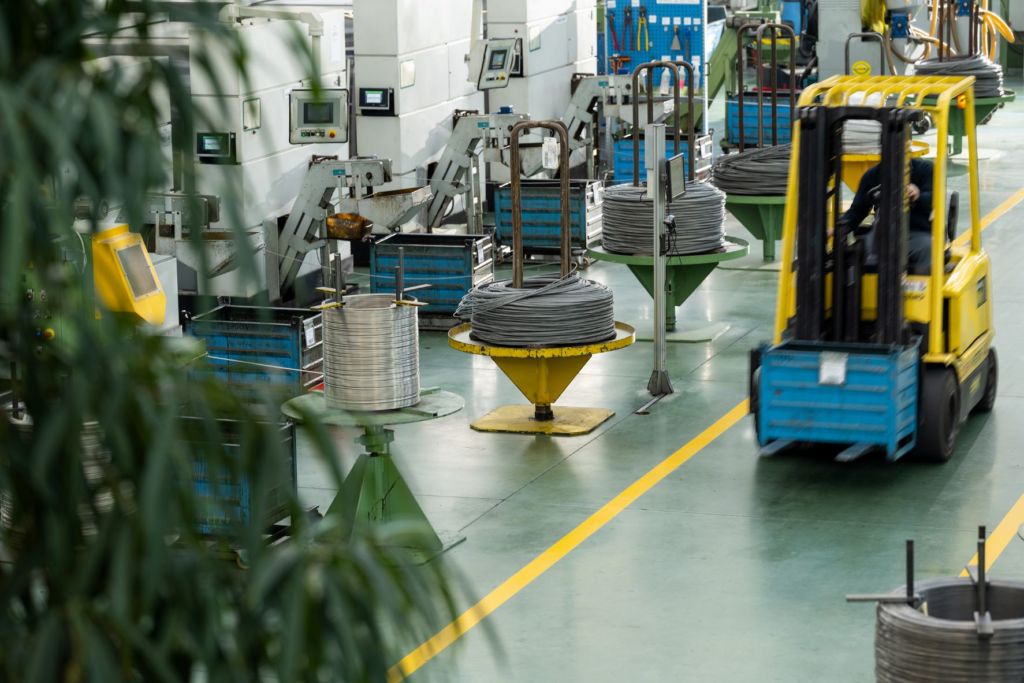
Acquiring certifications in the management of our various business areas is fundamental: it means we always question ourselves to identify both our strengths and above all the aspects that we can implement in a different and better way.
Particularly, within the green field, we have acquired the ISO 14001: 2015 certification since 2020.
By respecting its standards, we create an Environmental Management System based on a dynamic and cyclical process, thanks to which we can manage our environmental risk through the search for continuous improvement.
Sariv production department extends over two warehouses for a total of 9,000 square meters.
To power the activities carried out within our headquarters, we use the energy produced by a photovoltaic system installed above the roof of our factory, which allows us to independently produce part of the electricity we need.
Reducing the refuse produced is also one of our objectives and for this purpose we carry out a systematic differentiation of waste, however paying attention above all to reducing waste first of all.

Sariv has been working on process digitization for many years: each step of our production chain is managed through a complex IT architecture.
Not only has this project a practical utility in the management of production and quality. By implementing the dictates of the Industry 4.0, this project is also very useful in view of a sustainable change: specifically because all the information collected is digitally recorded on computer support, which has allowed us to eliminate the use of paper thanks to the digitization of all documents.
But bureaucracy, we know, sometimes prevails over common sense. Therefore, where it is not possible to eliminate printed documents, we are committed to using only recycled paper.
In Sariv we have invested a lot on digitization because we firmly believe in it. It is also important for us to help other companies develop this type of technology internally.
With this in mind, we have therefore established important collaborations with various enterprises and entities: the focus was always on constant improvement, both ours and of the other companies.
With a view to shared value as we explained at the beginning, we actively collaborate with the Politecnico di Milano, as well as with Confindustria (the main organization of Italian manufacturing and service companies): we promote events on the evolution of corporate digitization, hosting companies that want to touch automation with their own hands.
Some recent projects where you can read about us are:
– Fabbriche Vetrina, a project to spread a new type of management, in which Sariv is among the case studies
– The Next Door Innovator: meetings where selected companies illustrate and share how they have successfully developed innovative business solutions.
Green economy passes also through digital transformation.
Until a few years ago, the degreasing process of our products was carried out using water.
For some years now however, our line has been implemented with an innovative washing system that’s allowed us to completely eliminate water from degreasing: it is a washing machine with modified alcohols that operates under vacuum, and separates the mechanical processing oil from the washing solvent so as to allow its reuse in the circuit.
The use of modified alcohol allows a low environmental impact and the elimination of waste: it can in fact be vacuum distilled between 90° and 100°, and then recovered through a double distillation unit which removes it completely from the oil without any stress to it. In this way, on the one hand we get distilled oil, and on the other we get alcohol, which can be reused in a new degreasing process.
Since 2017, Sariv facade has been renewed: we had a curtain wall installed in eco-sustainable material, which guarantees excellent thermal insulation.
This helps us to avoid heat loss during the cold season or the entry of hot flows during the summer. It also contributes to the reduction of thermal bridges, makes the heating plant more efficient, and extends the life of the building.
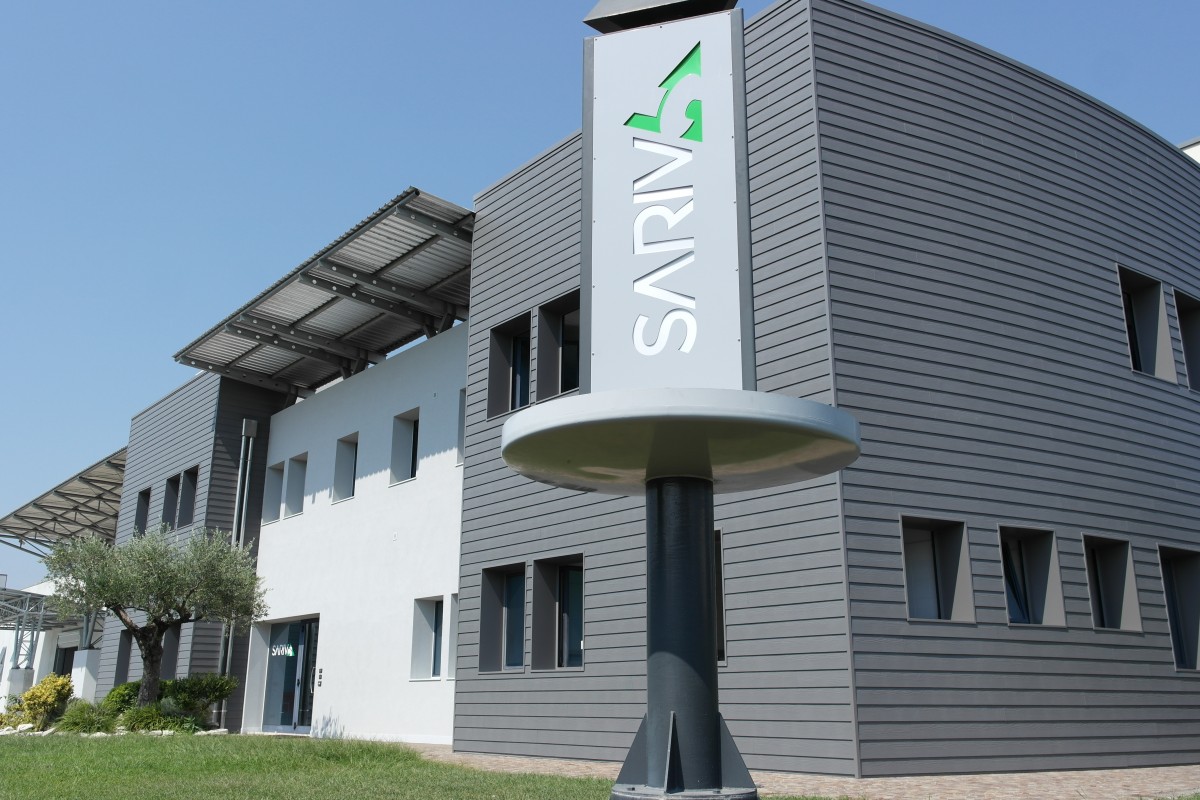

Remote working is a practice that in Sariv we have been testing for some years. No one, in such modern and advanced times, could have ever imagined that it would be useful in the event of a pandemic, but indeed it was.
Although in the misfortune of a situation of extreme uncertainty, we had to roll up our sleeves and try to respond promptly to the emergency: and this is how remote working has become the solution to provide all office employees with the opportunity to continue thier activities, without interrupting customer services.
To date, although the emergency has subsided, we have deemed it important not to abandon this good practice that brings a double benefit: on the one hand it reduces emissions by decreasing the use of the car for employee travel; on the other hand, the employees themselves benefit from it with an improvement in the balance between professional and private life, since they can dedicate to themselves the time they normally lose to get to the workplace.
Some research carried out has actually highlighted how remote working increases the degree of satisfaction of workers, and also their level of engagement.







